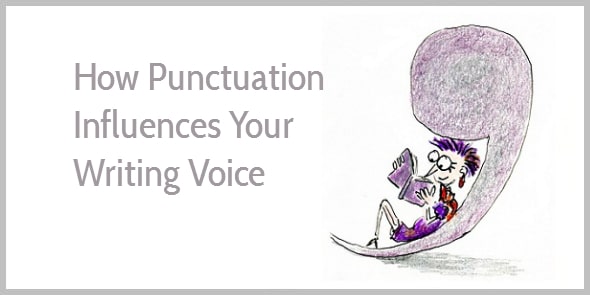
Proper punctuation is both the sign and the cause of clear thinking.
~ Lynne Truss (Eats, Shoots & Leaves)
Yeah, yeah.
But who really cares about punctuation?!?
Writing is hard enough. You must think about writing proper sentences, choosing the right words, and avoiding spelling mistakes. Who has time to worry about commas and full stops?
Isn’t worrying about commas and semi-colons for grammar freaks and pedantic teachers? For poets and writers with too much time to ponder away?
I was working on the proof of one of my poems all the morning, and took out a comma. In the afternoon I put it back again.
~ Oscar Wilde
In the past years, I’ve come to understand that I’ve been wrong about punctuation. These humble marks in our writing matter more than I thought.
Punctuation changes your voice. We can sound more excitable. Or authoritative. Or empathetic. We can build suspense. Make readers stop, or get them to rush ahead to the next paragraph …
Want to know how?
The most powerful punctuation mark
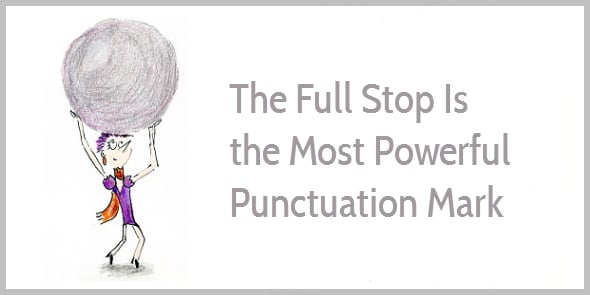
It’s an easy mistake to make.
Many writers think the exclamation mark adds power to their voice. But that’s untrue. The real power comes from full stops.
For instance, read this final paragraph aloud:
Your job as a blogger is not simply to write tutorials, to share tips, facts, and advice.
A useful tip that’s not implemented is like a riveting book that’s never opened. It’s forgotten and useless.
Instead of acting solely like a blogger dishing out your tips, become a mentor for your readers, a chief of your village, a leader of your tribe. Fire up your tribe and jump-start their actions because your readers are waiting for you.
It fizzles out a little, doesn’t it? It doesn’t make you feel excited about your blogging journey.
Here’s an alternative version with more full stops:
Your job as a blogger is not simply to write tutorials.
Your job is not to share tips and facts and advice.
A useful tip that’s not implemented is like a riveting book that’s never opened. It’s forgotten and useless.
You’re not simply a blogger. You’re a mentor for your readers, a chief of your village, a leader of your tribe.
Come on. Fire up your tribe. Jump-start their actions.
Your readers are waiting for you.
From: A Rabble-Rouser’s Rules for Writing Kick-Ass Closing Paragraphs (Copyblogger)Using more full stops is the easiest way to invigorate your words. To add stress to specific phrases. To become more authoritative and inspirational.
But be careful. Don’t use full stops all the time as it would make the rhythm of your writing too monotone.
How to add a soft pause
If the full stop is a sign of power and authority, then the comma is a quiet whisper, creating a soft pause rather than an abrupt end.
The comma makes your text flow softly—like a lullaby of undulating sentences disappearing into the distance, sometimes turning into a wild river when a multitude of commas is used in one sentence.
Here’s an example of a sentence with 15 commas:
It was the best of times, it was the worst of times, it was the age of wisdom, it was the age of foolishness, it was the epoch of belief, it was the epoch of incredulity, it was the season of Light, it was the season of Darkness, it was the spring of hope, it was the winter of despair, we had everything before us, we had nothing before us, we were all going direct to Heaven, we were all going direct the other way—in short, the period was so far like the present period, that some of its noisiest authorities insisted on its being received, for good or for evil, in the superlative degree of comparison only.
~ A Tale of Two Cities, by Charles Dickens
If you replace all commas in the above sentence with a full stop, then the whole atmosphere of the sentence changes and the text becomes difficult and monotonous.
Play around with commas and full stops in your writing. Notice how it changes your voice.
My favorite punctuation mark
You may think that writing is a monologue. You are the writer. You share your thoughts.
But empathetic writers engage their readers with questions.
How?
Here’s an authoritative opening paragraph without question marks:
Most bloggers wish they’d gain more email subscribers when they publish guest posts.
You might work hard to establish connections with editors and share your most valuable tips in your guest posts. But if you ever feel disappointed with your guest post performance, then follow the tips below to get more email subscribers.
Here’s the more empathetic version with questions:
Ever wanted to know how you can gain more email subscribers when you guest post?
You work hard to establish connections with editors. You share your most valuable tips. You polish your writing until each word shimmers and shines.
But when your article goes up?
You feel a tad disappointed.
Why don’t more people join your email list? What’s stopping them?
From: How to Unleash a Surge of Email Subscribers from Your Guest Posts (Copyblogger)Note the difference in tone?
Next time you edit your writing, try a few extra questions, and see how it changes your voice.
The exclamation mark hints at lazy writing
If the question mark engages, the exclamation mark repels.
Why?
Because it’s overused! Or worse!!!
As HubSpot points out in their educational flowchart, only use an exclamation mark for real exclamations. Whoa! Let’s go!
In other cases, use powerful words instead of exclamation marks. Instead of writing She’s popular! try She’s mega-popular or She has a raving following.
Good writers choose their words with piercing precision so they don’t need to opt for lazy exclamation marks.
How to Use Punctuation to Fine-Tune Your Voice
There is an underlying rhythm to all text. Sentences crash and fall like the waves of the sea, and work unconsciously on the reader. Punctuation is the music of language. As a conductor can influence the experience of the song by manipulating its rhythm, so can punctuation influence the reading experience, bring out the best (or worst) in a text.
~ Noah Lukeman, A Dash of Style: The Art and Mastery of Punctuation
Stop thinking punctuation is for grammar sticklers and pedants.
Punctuation matters.
Start playing with commas, full stops, and question marks. Read your text aloud, and notice how your voice changes.
Have fun!
PS Want to learn how to use punctuation correctly? The online punctuation guide is useful, including lots of examples.
Recommended reading on voice and punctuation:
How parentheses can set the tone of your writing (yes, really)
3 ways to use an ellipsis aaaand … keep your readers hooked
Can this humble writing technique triple your persuasive power?Reader Interactions
Leave a comment and join the conversation
Comments
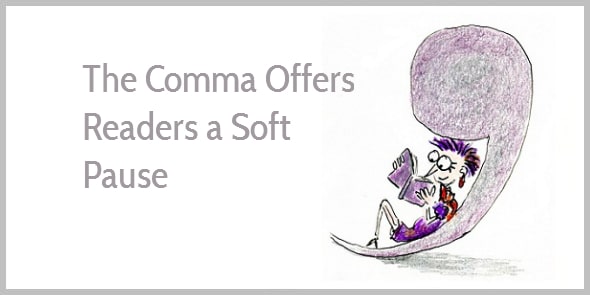
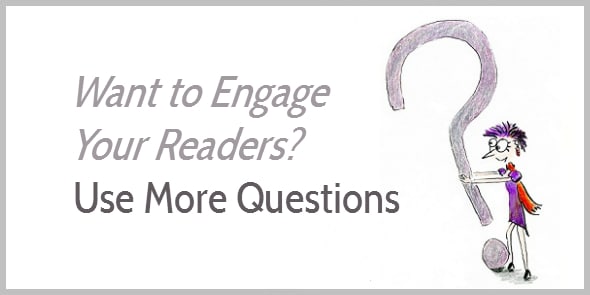
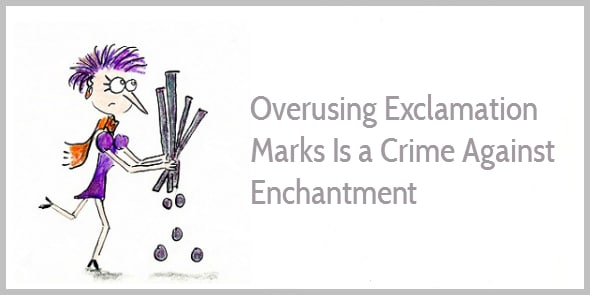


A big thank you, Henneke!
I stayed in front of this post for a long time. It made me think. I even took notes.
I’ve read this post before, but now I see it with a new eye.
Thank you for the extra links and the punctuation guide online as well. 😀
That’s such lovely feedback. Thank you, Alexandra. I am glad (and honored!) that you came back to read this again. 🙂
Probably I have read 15+ posts and become a fan of your writing. Your posts blessed me with tons of insights to think differently and get out from my comfort zone.
Thanks Henneke 😊
I’m glad you’re enjoying my writing, Sonia. Thank you for stopping by. I much appreciate it. And happy writing!
The post highlights the importance of punctuation. You’ve cleared the matter using some instances. It deserves appreciation.
Pls keep your efforts on providing us posts like this one.
Thanks a lot.
I’m glad you enjoyed this. Happy writing!
Thank you for the article! I am taking a grammar class and we are discussing punctuation. I linked to your article in my class discussion board talking about how punctuation can influence our voice and tone. If I may, I do have one small objection to a word used within the explanation of commas. I agree that commas are softer than periods, but the issue I have is with automatically associating the terms of “soft” and “quiet” as being inherently feminine, which can be seen with the word “sister.” I think it would be better to use “sibling” instead. On another note, I loved what you said about exclamation marks. It is good to keep in mind that we should use better words and not lazy punctuation. I will definitely keep this in mind in the future.
Hi Simone, I understand your point. I had thought of the punctuation marks as a band of sisters, and the comma being the quiet one. But I can see that it can be interpreted as the others are louder brothers, and only the quiet one is a girl. I didn’t mean it like that. I don’t really like the word sibling so will try to think of an alternative.
Henneke,
Another useful post. Thank you. I’m learning to refrain from unnecessary exclamation marks and to shorten my sentences will a full stop. These are vital tips. Keep feeding us ideas on how to improve our writing.
Ann
P.S. The illustrations are, always, delightful.
Thank you so much, Ann. I’m glad you’re finding my tips useful. Happy writing!
Hi, Henneke. This blog is awesome! You are absolutely right about punctuation. It definitely influences our writing in a major way.
Thank you, Derrick! I’m glad you enjoyed it. Happy writing 🙂
There is no post of yours that’s not useful. You never disappoint, there’s always something to learn. Thank you for being so generous
Thank you for your lovely compliment, Tamara. I appreciate your comment 🙂
This is something I need to work on. I love that you pointed out exclamation points can be lazy. I think I knew that was true on some level but I was in denial. Great article, as usual 🙂
Thanks so much for your lovely comment. Happy writing 🙂
When I read your blog, I feel inspired, more confidence.
don’t know why?
I’m glad you’re feeling inspired and more confident. This is what I aim to do with my writing 🙂
Thanks for the Punctuation Guide Henneke and cool use of Henrietta?
Henrietta seems to love reading in her comma-shaped sofa 🙂
Thank you, Lisa, for stopping by.
I really enjoyed reading this blog. It was informative and very helpful, but not boring and stuffy. It made it okay for me to relax a little. It help me understand that it I don’t have to be grammarily correct at all times, but have fun and enjoy writing. Yes, the word “grammarily” isn’t in the dictionary, but it is in mine !
Yes, it’s important to have fun with your writing. Happy writing, Jeanette! 🙂
I was recently thinking about the same topic. But you have put it in a really fun and enjoyable way.
Loved to read it.
Thank you for your lovely comment, Aditya.
Brilliant post!
Thank you, Soniya 🙂
Great post, Henneke.
Charles Dickens shows us all how an ” overused ” punctuation can sometimes be a real winner. I agree with rules, but at times they have to be broken to produce classic reasons why we should not follow the rules.
Poor fellow, he probably failed English Grammar at school.
Yes, that’s true. “Overused” punctuation can work. It’s kind of: you need to know the rules, and then feel free to break the rules 🙂
Thank you for stopping by, Paul
Could Commas and Cats be Connected?
Really?
Yes…they can.
Strangely. Fascinatingly, Pun-ishingly so:
OK. OK here goes.
“A comma is a pause at the end of a clause;
A cat has claws at the ends of its paws”.
Catastrophic?
This made me a laugh. I like it 🙂
Thank you, Owen.
What a fabulous post. I’m doing a writing course at the moment, and my biggest issue is punctuation. Reading this fun and easy to follow post helps enormously. And I adore the sketches.
Hey Henneke,
Really great job with this.
In the past, I had a lot of issues with punctuation.
I would definitely abuse the exclamation mark when I didn’t have to. And you’re right . Those that tend to do that is typically lazy.
But I improved my writing over the years and I’d like to say I’m much better. Especially when using the question mark.
That really does help engage readers and is my favourite punctuation mark too. Thoroughly enjoyed this.
– Andrew
I’m glad to hear you like the question mark, too! 🙂
Hey Henneke,
A very informative article on powerful usage of punctuation. I also used to think that an exclamation mark can boost the impact of a sentence. Thanks for clearing the misconception 🙂
Proper use of punctuation can only portray the right intention of any message. Thanks for sharing. Take care.
Thank you, Manidipa. Happy writing!
You are just getting more brilliant every time you write. I need to read this a few more times to grasp the significance of all the nuances.
Mastering punctuation may be the secret to writing well! It’s the hidden structure that holds the integrity of a sentence together.
Yes, punctuation is probably more important than most of us think. It’s not just about using punctuation correctly, but about using punctuation to express our voice and adjust our tone.
Thank you for your lovely comment, Saleem. 🙂
You explain punctuation very eloquently, I am in awe; also for the Punctuation Guide link, which I will no doubt use often.
Thank you, Karina. Happy writing!
I have nothing to add. Period.
Me neither …
Wow!
Hey Henneke,
I had no idea punctuation was so important.
I remember someone telling me that full stops were a bad thing. At least now I know they can actually help. 😀
The question marks, too. I’m going to try to use them more in my writing. 🙂
Thanks for the post, Henneke.
You’re the best!
Julian
Yes, I love full stops. I don’t know why anyone would call them bad.
Happy writing, Julian! And thank you for stopping by.
Thanks, Henneke. What fun to romp barefoot again in the world of punctuation.
The former editor in me is stuck on the compound predicate in the Noah Lukeman quote that is separated by an unnecessary comma. Delete! Delete!
And … what about those other, more nuanced forms of punctuation: the ellipsis; the colon; the semi-colon; the em dash–?
XXOO
M.
Yeah, it’s an unnecessary comma. I can see you’d want to cross it out. I find it supports readability, so I quite like to have it. I probably use far too many commas for your liking 😉
Perhaps I can pick up the courage to write another post about the other punctuation marks some time. Who knows?
Thank you for stopping by again, Marcella!
Great article, thank you.
You’re welcome 🙂
Hey Henneke,
Punctuation adds a road map to your writing. It let’s you know when to stop, slow down, speed up and go with the flow of traffic.
I like the examples you have here. I try to add more questions within my posts now to include my readers more on the topic. It engages them more and it feels like you’re speaking directly to each one of them. At least that’s what it feels like when I read posts with questions.
Thanks for sharing Henneke! Have a great day!
Yep, so true, and well put. Without punctuation we would get lost. Try reading a text without punctuation… that’s a real struggle!
Thank you for your comment, Sherman. I’m glad you like my examples 🙂
Wonderful, educational, thoughtful piece.
Thank you, Terry!
I never get enough of your posts Henneke.
The fun part is reading them out loud…every single word of the post – always!☺
The comma is my favourite punctuation too.
I’ve seen some people messing them up though…In an attempt to add flavour, the writing ends up being too choppy and sleazy.
I’ll rather have that though than an unending sentence that leaves one huffing and puffing.
As for exclamation marks ( the smiley faces of the punctuation world☺)…i used to enslave these poor symbols. Thanks to your rehab, I’m recovering and haven’t used? in a while.
We rely on them far too heavily when what we really need to do is to go back to our words and try to make them convey more precisely what we’re trying to say.
But…i trust you to stamp out these crimes.
Keep them coming my lady.
Yes, I hate the huffing-and-puffing sentences, too, when somewhere halfway you get lost wondering what’s connected to what, so you have to start again to figure out the meaning of everything.
I do my best to stamp out these crimes against enchantment 🙂
Thank you for your lovely comment, Linda. I appreciate it!
Hi Henneke,
Great stuff! Glad to see my liking for short paragraphs
is shared by Copyblogger.
Punctuation does matter, as you’ve shown here. I wish you’d
been my English Language teacher. I love the examples you’ve used
especially the Dickens one. The comma in (what is possibly the longest sentence
ever) gives the sense of a wheel turning, which also draws in the reader.
Great writing always brings in readers. You show how punctuation makes this possible.
– Tom
PS., I wonder if the emoticons are new punctuation marks? 🙂
I don’t think that as a non-native speaker I’d be allowed to teach English! My accent would put any school head off 😉
That sentence from Dickens is crazy in a nice way, isn’t it?
Lynne Truss discusses emoticons briefly in her book Eats, Shoots & Leaves and calls them “the greatest (or most desperate, depending how you look at it) advance in punctuation since the question mark in the reign of Charlemagne.” So, I think they qualify as punctuation marks 🙂
Shorter sentences make for a faster read and happier reader. That’s what it’s all about. Thanks for the reminder.
Yep, that’s it 🙂
Thank you Henneke, now I have learnt the usage of these punctuation marks!
I will certainly use these marks in my writing, with careful placement.
Happy writing! 🙂
Thanks Henneke, a timely reminder as I head into a few weeks of writing posts. I am guilty of overusing the exclamation mark. I always go back and take a bunch out, but I like your advice of only using them for real exclamations. I’ll give it a try! (Is that right to put one there?)
With comments or on Twitter, I tend to use exclamation marks a lot more often than in blog posts or emails. So, I’m fine with that exclamation mark 🙂
Happy blog writing, Lisa!
Thanks Henneke! That gives me an idea about how strict to be with my new resolution.
Well!
As a grammar stickler and a punctuation pedant, I must say, you had me at “Truss”. I was itching to slide down here and exclaim about the darling “apostro-tree”. I’m so glad I did not, since it actually was a comma. Ha!
I constantly marvel at an ESL learner teaching English speakers their own language. Great job, as always, Henneke.
I have written about overuse of exclamations on Jim Bessey’s site, and would like to add clarification about its use:
Yes, as you said, the clipped and true exclamation needs the exclamation mark. There is another instance when we may choose to include it, when we use those “question” words and are not asking anything, but exclaiming, such as, “What a beautiful day!” This is merely a point of intent, though. The same sentence could be intended to indicate sarcasm, such as we might say flatly on a very muddy, raining day. Then, omitting the exclamation point truly relays the point.
My most overused punctuation is what Mary DeMuth calls “word art”, the smiley. 🙂
Yes, that’s an excellent point. I didn’t make that clear. Thank you so much for adding that, Katharine.
And who knows … perhaps the apostrophe can make an appearance in another post.
I always appreciate your comments, Katharine.
I really love that you detest that damn exclamation point as much as I do. It’s so overused!!! And it’s so obnoxious!!!!! Always a pleasure to read your advice. THANKS A TON FOR SHARING!!!!!!!!!!!!!!!!!!!!!!!!!!
My fingers are itching to edit your comment. But I’m resisting! 😉
Thank you, Shannon, for stopping by 🙂
Definitely encouraged to play with punctuation after reading your post, Henneke. Totally with you where you say that the full stop holds more punctuational (is that a word?) power than the exclamation mark. I tend to get turned off by what seems to be an over use of the exclamation mark in marketing copy or blogs. Making a stand for the full stop.
Let’s add “punctuational” to the dictionary. Why not?
I like making up words. Even “snackable” isn’t officially a word (but I didn’t make that up myself). Shakespeare also made up words.
Thank you Henneke. It sounds like you had fun writing this article – terrific Oscar Wilde snippet. You demonstrated the use of the full stop and comma beautifully (your dislike of exclamation marks is well known ….).
Kind regards
Mark
Haha! My dislike of exclamation marks is well known … I persevere in my mission 🙂
And yes, I had a lot of fun. Well spotted! 🙂
Great read, I especially enjoyed the part about asking more questions. I did noticed a small typo in your Noah Lukeman quote though:
“There is an underlying rhythm to all text. Sentences crashing fall like the waves of the sea, and work unconsciously on the reader.”
It should be “sentences crash and fall…”. You can see it here (about 5 paragraphs down) – http://www.lukeman.com/adashofstyle/read.htm
Oops. That’s a good catch. I’m going to correct it straightaway.
Thank you!
Another valuable piece of advice for content creators everywhere. Thanks Henneke. There’s been a lot of discussion about the relative desirability of the written vs. the spoken voice. The two will never be the same, but this post shows how to make written prose as powerful as a well delivered speech…maybe even more so.
For me, the advantage of the written word is that everyone can consume it at their own speed. This is what I find hard sometimes with podcasts – they either go too fast or too slow for me. They give my mind too much chance to wander off or not enough time to process the ideas. Also, sometimes podcasts ramble too much for my liking 😉
So, here’s to the power of the written word!
Thank you for stopping by, Rodney. I appreciate it.
I first read that quote from Oscar Wilde about 20 years ago and my immediate reaction was. . . fist pump (exclamation mark, exclamation mark – which of course I never use) Yes (God, I want to use an exclamation mark here). I agonise over punctuation, which is why it takes me three weeks to write a first draft of anything. And I thought I was alone.
Cheers, Mel
I tend to agonize over commas and full stops (and semicolons and dashes!) when I’m editing my draft. I know in some cases, I’ve made changes to the punctuation of one sentence three of four times 🙂
Have you read the book Eat, Shoots & Leaves?
Thanks Henneke,
Having been in advertising for many years, I’ve always been hyper-aware of the rhythm of sentences. We’d tinker with different configurations of headlines for hours, just to create the magic combination that tickles the brain in just the right way.
If you look at popular taglines or award-winning headlines, it’s easy to see how they could have been drab with only a slight difference in the wording or the punctuation. With words, we’re not just imparting meaning, we’re signalling intentions.
Thank you for this excellent primer on punctuation. Even old dogs can learn new tricks.
I can imagine that in an advertising agency deciding on wording and punctuation could take days rather than hours 🙂
Thank you for stopping by again, Jon. I appreciate it.
Yeh, well, after the creative team is happy, you’ve got the creative director. Then the account people, then the client, and so on. But that’s another story.
Excellent article, HK. And your drawings continue to be an 11 on a scale of 1-10, especially the period and comma. Priceless.
Fast question: In the section on question marks, you say:
“But when your article goes up?”
Hmm. I sense that’s more of a statement leading into another statement or potentially a question but itself not an actual question. Did you intend it that way?
The period and comma are my favorite illustrations in this post, too 🙂
Yes, that’s not a correct full sentence, and some editors might not like it. A strict editor might prefer: “But what happens when the article goes up?” or “But what do you experience when the article goes up?”
The shortened sentence is more colloquial. It was approved by Copyblogger editorial team.
Okay, cool. I do see how it would be a colloquial use.
If we ever meet, please, whatever you do, do not introduce me as a “strict editor.” 😉
Haha! Don’t worry 🙂
You could probably also replace the question mark by an ellipsis (…); that would work, too, at least for me. Some editors hate ellipses and find them unnecessary. A lot of punctuation “rules” are personal preferences. I’m not a punctuation stickler (but I do appreciate proper use of the apostrophe 😉 ).
When ellipses are used properly, I think they convey intent very nicely.
Bottom line, grammar exists to assist in the communication of our message. It can improve speed of understanding and quality of understanding. What’s not to like about that?
Power to the punctuation! Love how beautifully you illustrate this, Henneke.
Thank you, Cathy. Creating the illustrations was fun! 🙂
Always enjoy your tips. Keep up the good work! ( Overuse of !? LOL )
Thank you, Deborah! 🙂
Wow, this is almost creepy:
I published a post just this morning about rhythm in writing. And the power of the full stop. And the over-usage of the exclamation mark 🙂
So, yeah, I totally agree, hehe. It’s often those fundamentals that seperate mediocre from outstanding copy.
Punctuation really seems like beginners’ stuff. But get it right and you can boost the readability of your copy tremendously.
Thanks once again for this fun to read and easy to implement post, Henneke.
Have a good one
Chris
Hey, that’s spooky!
Great minds think alike as they say 🙂
Love this! You are brilliant. We would have legions of engaging writers if the English language was taught with the passion you have for it. Thanks for the inspiration… and clarity on a topic that up to now seemed very academic. ?
In my experience, most language teachers focus on using language correctly. Of course, using language correctly is important, as we need to follow some conventions to be understood.
But I’d love to see more teachers nurture a love of language plus teach students how to use language to engage and persuade.